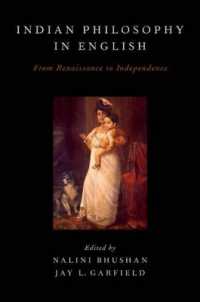- ホーム
- > 洋書
- > 英文書
- > Philosophy
Full Description
Minds Without Fear is an intellectual and cultural history of India during the period of British occupation. It demonstrates that this was a period of renaissance in India in which philosophy--both in the public sphere and in the Indian universities--played a central role in the emergence of a distinctively Indian modernity. This is also a history of Indian philosophy. It demonstrates how the development of a secular philosophical voice facilitated the construction of modern Indian society and the consolidation of the nationalist movement. Authors Nalini Bhushan and Jay Garfield explore the complex role of the English language in philosophical and nationalist discourse, demonstrating both the anxieties that surrounded English, and the processes that normalized it as an Indian vernacular and academic language.
Garfield and Bhushan attend to both Hindu and Muslim philosophers, to public and academic intellectuals, to artists and art critics, and to national identity and nation-building. Also explored is the complex interactions between Indian and European thought during this period, including the role of missionary teachers and the influence of foreign universities in the evolution of Indian philosophy. This pattern of interaction, although often disparaged as "inauthentic" is continuous with the cosmopolitanism that has always characterized the intellectual life of India, and that the philosophy articulated during this period is a worthy continuation of the Indian philosophical tradition.
Contents
Preface
Introduction
1. The Tragedy of Indian Philosophy
2. Looking Backward: Reason, Cosmopolitan Consciousness and the Emergence of Indian Modernity
3. The Company and the Crown: Macaulay's India?
4. On the Very Idea of a Renaissance
5. Reform Movements: From Universality to Secularity in the Brahmo and Arya Samaj
6. India Imagined: Contested Narratives of National Identity
7. Anticipating India's Future: Varieties of Nationalism
8. Theorizing Svaraj: Politics and the Academy
9. The Cambridge Connection: Idealism, Modernity and the Circulation of Ideas
10. Maya vs Lila: From Sankaracarya to Einstein
11. The Question of Subjectivity: Neo-Ved?nta in Academic Philosophy
12. Indian Ways of Seeing: The Centrality of Aesthetics
13. The Triumph of Indian Philosophy: Thinking through the Renaissance
References








